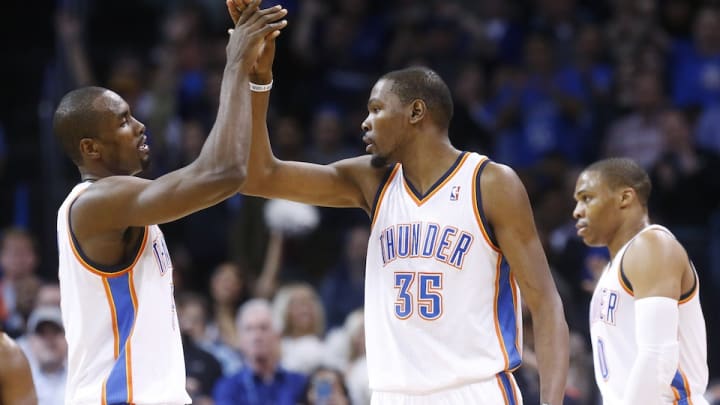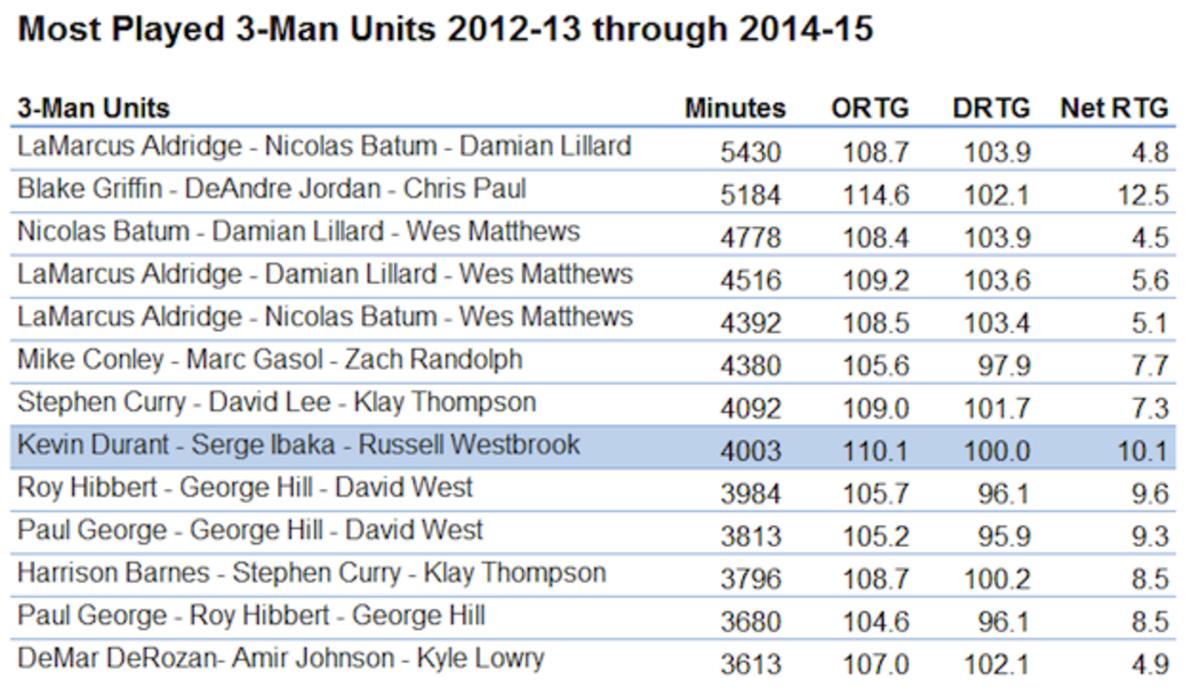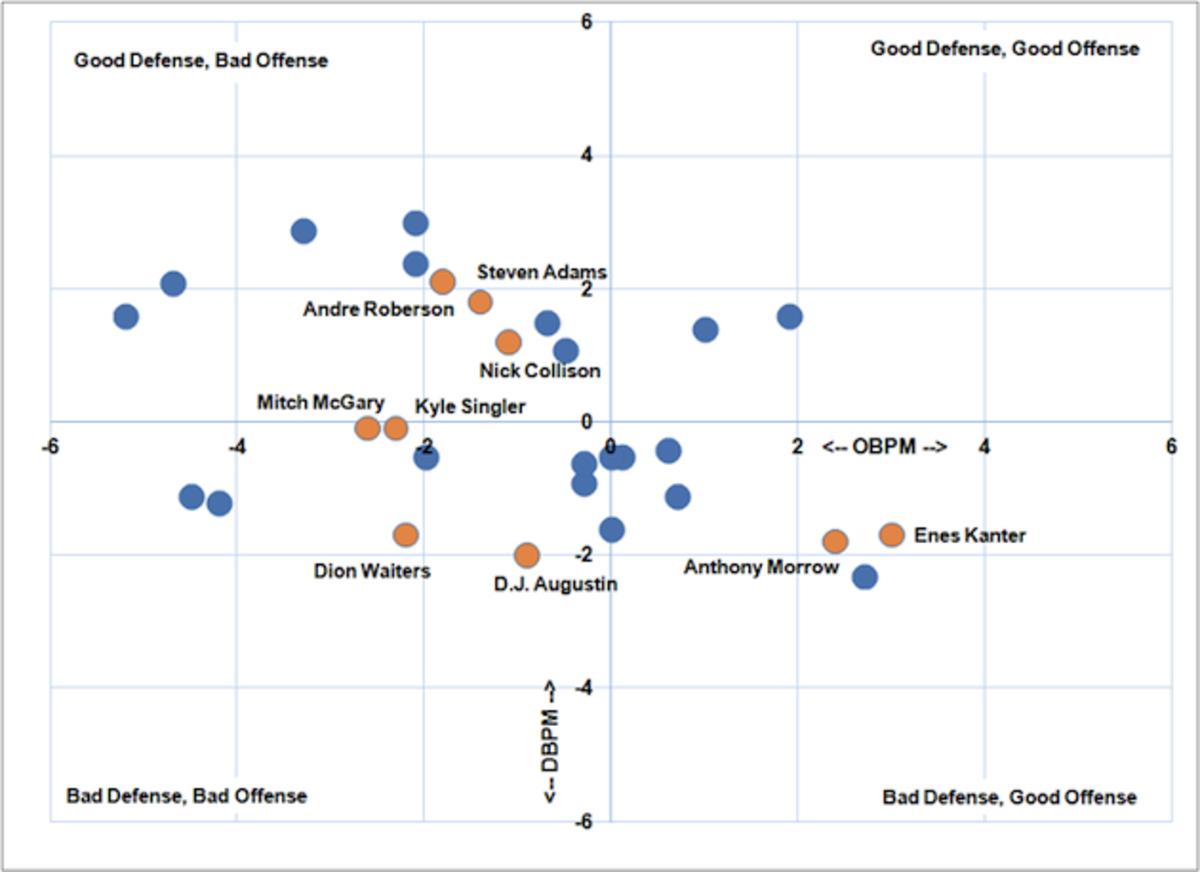Good Health, and Good Luck: How Oklahoma City can win a title this year

Let’s get two things out of the way. First, the Oklahoma City Thunder are going to be very, very good this season. Which is what makes the second part so hard to write: It might not matter.
Last year was a disaster for Oklahoma City. Setting aside Russell Westbrook's extended Superman impression (reminder: it was incredible), let's recall what the Thunder were forced to endure: Kevin Durant missing nearly three-quarters of the season, the bottom half of the roster undergoing a dramatic overhaul, the team missing the playoffs for the first time in five years, and Scott Brooks' firing at the beginning of the summer. Frustrations mounted, teammates openly feuded with one another, and stars butted heads with the media, the squad assuming an air of chaos at direct odds with their sterling, responsibly stewarded reputation.
Collective memory in the NBA, as in most professional sports leagues, tends to be short, though. With the Thunder, it’s easy to focus on all that grating, ugly messiness, cast it in the shadow of Durant’s impending free agency, and assume this is a team on the verge of disintegration, but doing so betrays what remains the most important fact: Had Durant been healthy, the season could have been drastically different.
• MORE: Grading the off-season of teams in the Northwest Division
When Oklahoma City made the decision to trade James Harden three years ago, it was a calculated gamble made with the seemingly safe assumption that the trio of Durant, Westbrook and Serge Ibaka would eventually be enough to get the Thunder over the mountain. They may not yet reached the summit, but it certainly hasn’t been for lack of their core's production.

When Durant, Westbrook and Ibaka have been on the floor together, the Thunder have outscored opponents by an average of 10.1 points per 100 possessions. A team able to maintain that level of point differential across an entire season would project to win about 68 games, so we’re talking about elite territory. The issue: Because of each player’s injury struggles, the Thunder have only had that trio intact for 152 of a possible 246 games over the past three seasons (or about 62%). Sadly, that pattern has held for the playoffs as well, with the three suiting up in just 19 of 30 games ( 63%). Last year, the group managed only 616 minutes together.
And we're surprised they didn’t make the playoffs?
Injuries have driven much of the Thunder's narrative arc, from the Harden trade up to the present day. In 2012–13, OKC won 60 games, the most in the Western Conference, and seemed poised for a Finals rematch with the Miami Heat. That is until Westbrook tore his meniscus after a collision with the Houston Rockets’ Patrick Beverley. The next season, Westbrook missed 27 games in the middle of the season after another surgery on the same knee. Durant’s MVP campaign helped carry them to 59 wins, but their title pursuit was short-circuited by a calf injury to Ibaka, who missed the first two games of the Western Conference Finals against the eventual-champion San Antonio Spurs. By the time Ibaka returned, the Thunder were in an 0–2 hole they couldn’t escape. Last year, it was Durant’s turn to watch helplessly from the folding chairs, playing in just 27 games as he recovered from a broken foot.
Assuming all three can finally stay healthy, there's no reason to believe these Thunder can’t be just as potent as in seasons past.
Of course, there remains little in the way of direct links between elite three-man cores on one hand, and banners on the other. In fact, Stephen Curry, Klay Thompson and Harrison Barnes (Draymond Green?) form the only core trio that has contributed significantly to winning a title over the last three seasons. In addition to health and luck, the pieces that surround a big three are incredibly important. Durant, Westbrook and Ibaka have been that good even with a forgettable supporting cast. That's important, not only for how we eventually come to contextualize their respective legacies, but because their newly made supporting cast seems doomed to sing the same old tune.
The graph below shows the seasons of every Thunder player (not including Durant, Westbrook and Ibaka) with at least 500 minutes played over the last three seasons. Each is plotted by Offensive and Defensive Box Plus-Minus — a box-score-derived estimate of a player’s impact per 100 possessions. A BPM of zero on either side of the ball is considered average. Returning Thunder players are marked in orange.

Since their lone Finals run in 2012, the Thunder have seen just two players chart above-average contributions at both ends of the floor — Thabo Sefolosha and Nick Collison, both in 2012–13. In filling out the rotation, Scott Brooks was often forced to choose between offense-only players (Kevin Martin and Reggie Jackson) or defensive specialists (Kendrick Perkins and Hasheem Thabeet).
Next season’s roster doesn’t appear to offer a solution. In the frontcourt, new head coach Billy Donovan will have to choose between Enes Kanter, a potent scorer but wanting defender, or Steven Adams , the uber-physical, surprisingly mobile big man capable of little more than dunks and tip-ins on offense. On the wing, the options are Anthony Morrow’s shooting, Andre Roberson’s defense or Kyle Singler’s below-average everything. In the backcourt, there's rookie point guard Cameron Payne, Dion Waiters and D.J. Augustin, the latter two of which were both well below average on offense and defense last season.
To a certain degree (and for pretty much every team in the league), every rotational decision is a tradeoff. But those sacrifices seem to be especially pronounced with the Thunder’s roster, both historically and as things stand today.
NBA players entering pressure-filled contract years in 2015–16 season
What we're left with is a situation that feels all too familiar. The Thunder will likely be very good this season, and have as good a chance as any team of capturing the conference crown. Piecing together a deep playoff run will hinge upon the health of their core trio (and those three staying on the floor together), whether the bench can develop into something resembling a reliable unit, and—perhaps the biggest X-factor of them all—whether luck can finally break their way.
It's a calculus made even more complicated by the fact that the Thunder are really fighting two battles this season : competing for the franchise's first-ever title, while at the same time convincing Durant to make Oklahoma City his home for good. As such, simply being healthy and good may not be quite enough; a championship remains the most convincing case the team can make to its incendiary star.
At a more visceral level, however, what the Thunder must offer Durant is hope—some semblance of optimism that this team is no longer doomed to repeat the vicious cycle of being almost-as-good-as-it-takes. If Westbrook or Ibaka can’t stay on the floor, the whole season could collapse in an instant. If the bench players continue disappoint, running into their own personal limitations of skill and talent, the rug could be pulled out faster than a three-game East Coast road trip.
Then again, the Thunder could be great. Even historically great, given their core's prime-embedded pedigree. Finally, there's also perhaps the most heartbreaking of all NBA universes: having it all break your way, and still falling short.
Just as they have for the better part of a decade, the Thunder stand to be, on paper, one of the best teams in the NBA. Now it's time to find out whether that promise is worth more than the thin pulp it's printed on.
